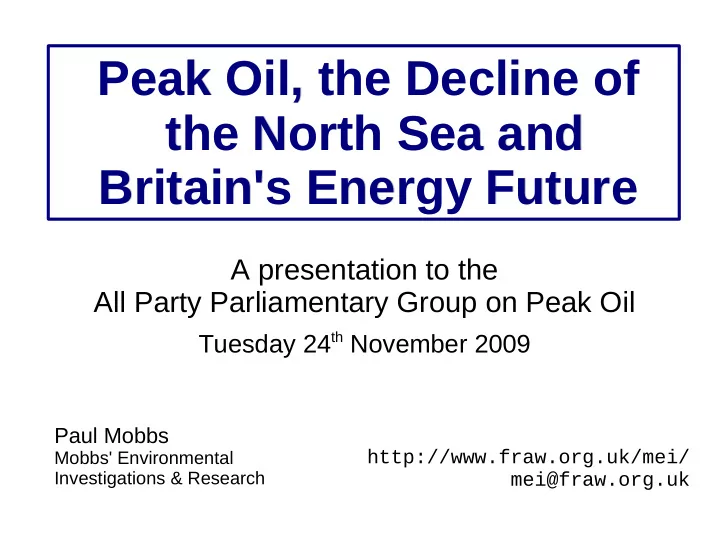

Peak Oil, the Decline of Peak Oil, the Decline of the North Sea and the North Sea and Britain's Energy Future Britain's Energy Future A presentation to the All Party Parliamentary Group on Peak Oil Tuesday 24 th November 2009 Paul Mobbs http://www.fraw.org.uk/mei/ Mobbs' Environmental Investigations & Research mei@fraw.org.uk
A holistic versus specific view... ECONOMIC ASSET ACTIVITY VALUE ENERGY FUEL
A holistic versus specific view... National wealth ECONOMIC ASSET ACTIVITY Loan VALUE guarantee Inward ENERGY investment FUEL
A holistic versus specific view... Confidence National wealth ECONOMIC ASSET ACTIVITY Capital Loan VALUE investment guarantee Monetary Inward ENERGY flows investment FUEL
A holistic versus specific view... Confidence National wealth ECONOMIC ASSET ACTIVITY Capital Loan VALUE investment guarantee Monetary Inward ENERGY flows investment Low prices Security of FUEL (supply chain supply efficiency)
Petroleum balance, 1930-2020 UK “peak oil”, 1999 Supply
UK natural gas balance, 1930-2020 UK “peak gas”, 2003
UK coal balance, 1930-2020 UK “peak coal”, ~1925
UK energy supply balance, 1930-2020 Total supply
Projections and uncertainties The UK energy trade produced a £7bn surplus in 2000, but a £9bn deficit In 2008. The energy-related proportion of the goods & services trade deficit was: 2005, 10%; 2006, 12%; 2007, 15%; 2008, 25%
An economic not just energy transition The implications of North Sea and coalfield depletion are far greater than just 'energy security' – they pose significant economic challenges for the operation of the economy Depletion is significant not only because of the drain of capital from the economy, but also the loss of foreign exchange from exports to pay for external debt – we will have to spend more outside the economy to pay for fuel Within the economy the loss of revenue poses problems for public finances and investment
An economic not just energy transition There is a relationship between energy, energy efficiency and economic growth – changing the energy return (EROEI) and energy “quality” of the primary energy supply must have an effect on economic growth. I make no prognostications on “solutions” as the options are beyond the political concept of “business as usual”. It's a change every bit as radical as the 1980s
An economic not just energy transition Its impact on the politics and public finances of Britain... can hardly be exaggerated. It helped bank- roll Thatcherism... Some economists... have argued that without it the Thatcher experiment would have collapsed during 1981-2. One observer says: 'The Industrial shake-out of the early eighties, of which unemployment above three million was the conse- quence, was indeed financed with the considerable help of the oil revenues'. So there, to start with, is an irony. A great new source of national wealth helped to produce mass unemployment, or at least make it politically possible. Part 4, A History of Modern Britain, Andrew Marr, 2009
Further reading... The graphs and information from this presentation, including sources and links are detailed in the handout for this presentation – available on-line from my web site at: http://www.fraw.org.uk/mei/ Further information is available both from my book and the Free Range Energy Beyond Oil Project: http://www.fraw.org.uk/ebo/ In early 2010 I'll be undertaking another workshop tour of Britain – details available from early December on the tour website: http://www.fraw.org.uk/tour/
Recommend
More recommend